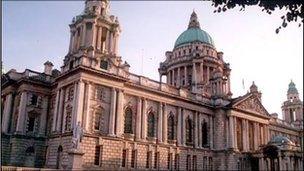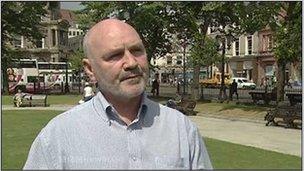The fall of the big house of unionism
- Published

The political fortunes of the Ulster Unionist Party at Belfast City Council have plummeted
Belfast City Council is Northern Ireland's largest council and for over a hundred years it was a bastion of unionist control.
That dominance in the council, particularly by the Ulster Unionist Party, continued until the 21st century.
The UUP took the highest number of seats across NI in the 2001 council elections, with 154 councillors elected.
In 2011 they will have just three on Belfast City Council.
Take a walk through the grounds of the city hall and among the statues is one of Sir Edward James Harland.
He is best known as the founder of Harland and Wolff, but he was also a member of the Conservative and Unionist Party, and served as lord mayor of Belfast from 1885 - 1886.
'Doyens'
Another monument features Sir Daniel Dixon Bart, who was a Unionist MP for Belfast North from 1905-1907. He also served four separate terms as mayor of Belfast between 1892 and 1906.
Veteran journalist Jim McDowell said for many years the city hall was the "big house of unionism", but that began to change when the Ulster Unionist's lost the "doyens" of the unionist party in Belfast.
"There were great characters in there who became lord mayors," he said.
"They had Tommy Patton, they had people in there who were the cornerstones of what the unionist working class vote was then.
"For a long time when Stormont was either prorogued or suspended, Belfast City Council was a kind of crucible of political debate.
"It was also a cauldron of supreme conflict."
He remembers one incident when a lord mayor took off his chain in the debating chamber during a meeting, and went up the stairs into the public gallery and grabbed a certain person by the throat.
It was also the venue for a huge demonstration against the Anglo Irish Agreement in 1985.
Around 100,000 people gathered outside the city hall that day to vent their opposition to the agreement which gave the Irish government an "advisory role" in NI's government.
Mr McDowell said the Ulster Unionists' political fortunes were unravelled by another unionist party.

Sinn Fein MLA Alex Maskey was the first member of his party to hold a seat on Belfast City Council
"The revolution came because the DUP went very hard at the UUP, under Ian Paisley."
'Change'
The former DUP leader known for his 'Never Never Never' mantra, was critical of the Ulster Unionists for signing up to the Good Friday Agreement.
In recent times the party has adopted a more moderate tone.
In a sign of how the political landscape in NI was changing, while the Ulster Unionists lost council seats, Sinn Fein and the DUP both celebrated major increases in 2001.
Their dominance in NI politics has continued with both parties increasing their electoral gains in the assembly, Westminster and council elections since then.
Sinn Fein's Alex Maskey was the party's first councillor to be elected to Belfast City Council when he won a by-election in 1983. He later went on to become the first republican lord mayor in 2002.
Sinn Fein leader Gerry Adams remembers back to those early days when the party took its first tentative steps into mainstream politics in Northern Ireland.
"I do reflect back quite often to the first time Alex Maskey came in here, and you know what happened was disgraceful - that the mandate which he had was not recognised," he said.
"He and others who were elected shortly after him were treated in a quite despicable way."
Mr Adams said things had changed considerably since then.
"Thankfully all of that is over and all of us are in a far, far better place," he said.
'Tolerance'
"One of the things that I have learned over the last 20 or 30 years is how you change people, is you change the political conditions in which they live.
"If you treat people properly and with some tolerance, you give people their rights and even though it's a hard battle, then you start developing personal working relationships, in the first instance."
Jim Rodgers has served as an Ulster Unionist councillor on Belfast City Council for 18 years.
He retained his seat in 2011 but is likely to be joined by only two of his party colleagues.
"We presently have nine in the UUP group, but we could well go down to just three members," he said.
Mr Rodgers said he was "very disappointed" with his own vote, which has dropped by around 1,000.
"In 2005 I had the highest first preference vote of any Ulster Unionist candidate in the whole of NI," he said.
"I know the work I've put in over the past six years, but the electorate in many cases have either turned against me or they just haven't bothered to vote."
He said he would be speaking to his electorate to find out what they want him to do and how he can "redress" the situation.
The emergence of the moderate middle-ground Alliance Party in NI in recent years has diluted the long-held dominance of green-orange politics.
The party has been in NI for just over 40 years and along with the DUP and Sinn Fein, has increased its mandate in the assembly, Westminster and council elections.
It has held the balance of power in Belfast City Council for the past 13 years.
Jim McDowell said the UUP's lack of electoral success has been compounded by a lack of strong leadership in recent times.
"The UUP just didn't have the kind of leadership after David Trimble left to try and counter the DUP threat, so what was happening at Stormont, at Westminster was reflected in the city hall.
"As far the UUP went, I think whenever the full frontal attack came on David Trimble and he lost the leadership of the UUP, the UUP lost its way to a large extent as well."